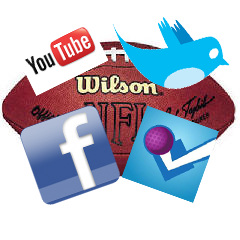 Social media feeds everywhere were set ablaze during prime time football games on television during the NFL Referee Lockout. Whether you were on Facebook, Twitter, Tumbler, Google+ etc, you were sure to see more than one of your friends (aka angry football fan) post about the terrible calls during the games.
Social media feeds everywhere were set ablaze during prime time football games on television during the NFL Referee Lockout. Whether you were on Facebook, Twitter, Tumbler, Google+ etc, you were sure to see more than one of your friends (aka angry football fan) post about the terrible calls during the games.
To give you an example, during one Sunday game (Broncos vs. Falcons), there were 170,000 tweets about the replacement refs. The infamous Packers vs. Seahawks game ended in a terrible, game deciding touchdown call that produced 1.9 million tweets about the NFL replacement referees!
Lessons to be Learned from all of This
Social media and sports are now joined at the hip as every fan tweets and posts at will their opinions on calls, plays, bad performances, or team spirit. You know that fan that yells “You suck _____” loud enough at the game for the television broadcast to pick it up? Yeah, that fan is now armed with a Twitter account and has no problem tweeting to his delight the play by play in his own “expert opinion”. Social media has made us all sports commentators at the bar, or on the couch as we watch the game. With all that being said, there are some lessons in social media that can be learned from all of this.
Here are some takeaways you can learn from the whole ordeal:
Pay Attention
The number one rule in social media is to pay attention! Not just to your fans and what they are tweeting, but to what’s going on in the news. If there is a trending topic that relates to your niche/business/blog, get on top of it with a blog post, a poll on your Facebook page or a few tweets. You are bound to get some attention and your fans will appreciate your dedication to a post about a relevant news topic.
Get in on the Conversation
Sports fans love their hashtags! If you were tweeting with the hashtag #NFLLockout, you probably gained a few fans and got in on the action as fans everywhere voiced their opinions across the Twittersphere! Just remember, if you want to get in on the conversation, make sure your tweets are relevant to the topic — no one likes spam or hashtag highjackers!
Anticipate Problems and be on Top of Crisis Situations
When you know a crisis is about to happen, or fans/customers/clients are going to be angry over a decision your company has made, be on the alert and anticipate the negative feedback. This means you need to have a response plan ready for a PR crisis and you need to take your tweets and posts off auto-pilot. You also need to pay attention to what’s going on and what’s being said. Obviously someone was not paying attention to what happened during the game when they posted an inaccurate photo and caption that showed a Seattle Seahawks player catching the ball for the touchdown after an incredibly terrible call (that as not a touchdown).


